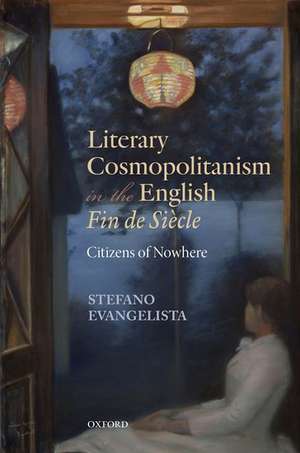Literary Cosmopolitanism in the English Fin de Siècle: Citizens of Nowhere
Autor Stefano Evangelistaen Limba Engleză Hardback – 22 iul 2021
Preț: 524.10 lei
Preț vechi: 656.08 lei
-20% Nou
Puncte Express: 786
Preț estimativ în valută:
100.32€ • 109.00$ • 84.32£
100.32€ • 109.00$ • 84.32£
Carte disponibilă
Livrare economică 19-25 martie
Preluare comenzi: 021 569.72.76
Specificații
ISBN-13: 9780198864240
ISBN-10: 0198864248
Pagini: 306
Ilustrații: 12 Illustrations
Dimensiuni: 163 x 241 x 22 mm
Greutate: 0.61 kg
Editura: OUP OXFORD
Colecția OUP Oxford
Locul publicării:Oxford, United Kingdom
ISBN-10: 0198864248
Pagini: 306
Ilustrații: 12 Illustrations
Dimensiuni: 163 x 241 x 22 mm
Greutate: 0.61 kg
Editura: OUP OXFORD
Colecția OUP Oxford
Locul publicării:Oxford, United Kingdom
Recenzii
This is an expansive project, but it is grounded in rich detail. The engagement with archives, correspondence, book design, and reader's reports from the John Lane collection at the Harry Ransom Center, allows for the startling, disappointing, and inspiring elements of late-Victorian cosmopolitan practice to emerge with clarity. It is in working with the grains and textures of this history that we can see what the cosmopolitan ethos actually managed to do and exactly how and why it fell short of its aspirations.
At a time when the humanities are coming under renewed pressure to explain their real-world relevance, this book does vital work in showing how engaging with our cultural past continues to bear fruit in understanding the knotted tributaries that construct our precarious presents.
The hope for future peace and mutual understanding expressed in the very term "Esperanto" is noble and worth striving for; in spite of its fin de siècle focus, Evangelistas stimulating book has a topicality which it is impossible to overlook.
All-embracing book
Evangelista unravels the conflicting associations of the term cosmopolitan with polish and vagabondage, worldliness and exile - and isolates the fin de siecle as a period in which the concept of cosmopolitanism came under increasing pressure from writers
At a time when the humanities are coming under renewed pressure to explain their real-world relevance, this book does vital work in showing how engaging with our cultural past continues to bear fruit in understanding the knotted tributaries that construct our precarious presents.
The hope for future peace and mutual understanding expressed in the very term "Esperanto" is noble and worth striving for; in spite of its fin de siècle focus, Evangelistas stimulating book has a topicality which it is impossible to overlook.
All-embracing book
Evangelista unravels the conflicting associations of the term cosmopolitan with polish and vagabondage, worldliness and exile - and isolates the fin de siecle as a period in which the concept of cosmopolitanism came under increasing pressure from writers
Notă biografică
Stefano Evangelista is an Associate Professor of English and Fellow of Trinity College, Oxford. He works on nineteenth-century English and comparative literature and is especially interested in Aestheticism and Decadence, the reception of the classics, gender, and the relationship between literary and visual cultures.
